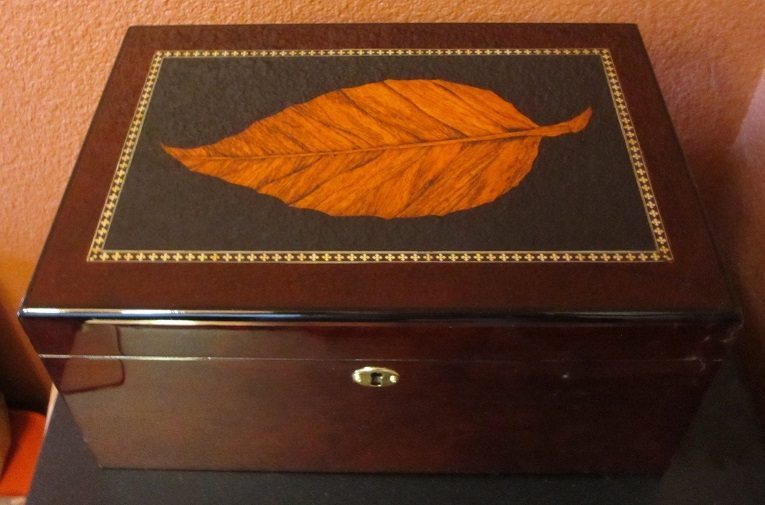There are various storage options available for your cigars. I wanted to cover some of the most common options available to give some insight on how to set them up and each of their advantages and disadvantages. This way, if you’re new to the hobby or just needing to expand your storage capacity, you’ll have some background on what options are available and what might be a good fit for you.
There are other storage options out there that I would say are less common, so don’t take this list as a guide to the only options available. We may also visit each of these storage options individually in the future to go over ways to acquire, setup and maintain them. We’ve already posted an in depth article on the desktop humidor which you can find here.
Tupperdor
This storage option consists of using any plastic sealable container, such as Tupperware. There are various sizes and shapes available, so you can be pretty creative on which one you want to go with. This may be something you already have laying around the house or can be purchased for pretty low prices.
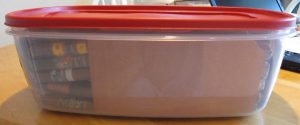
Once you have the container you plan to use, I recommend that you clean it with white distilled vinegar. This will clean it up and also help to get rid of any plastic smells that may be in the container that you don’t want mixing with your cigars.
I recommend adding some cedar into the container to help regulate humidity. You don’t want to take up too much space for the cedar, so some thin sheets that can be found in cigar boxes or a broken down cigar box would work well. You can just lay them down on the bottom of the container, lean them up against the sides or place them on top of the cigars.
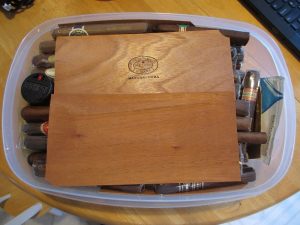
To maintain humidity, I would recommend using Boveda humidity packs. They take up very little space and in a well sealed container will last for quite some time. I’ve experienced packs lasting up to 1 year. You’ll also want to be able to measure the humidity and temperature in the container and I recommend using the HygroSet II hygrometer. Store the tupperdor in a cool location and with the other items that have been recommended, you will have a rock solid cigar storage option.
Advantages: Price, ease of setup
Disadvantages: Limited storage capacity, not aesthetically pleasing
Desktop Humidor
This option is what people most commonly associate with cigar storage. There are various size options as well as quality. You can find and purchase a mass produced option of even commission a humidor to build you one customized to your size and material specifications.
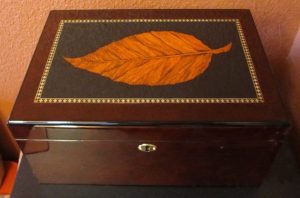
Once you acquire your humidor, you will want to season it. You can find more in depth info on how to do this in our article dedicated to humidor setup. To maintain humidity there are a couple of options I recommend. You can go with Boveda humidity packs, but depending on the size and seal, you may need multiple packs or to change them more frequently. The preferred option, in my opinion, is to use humidity beads. They are reusable, so when they dry out, you can recharge them, so they are pretty much a buy once solution.
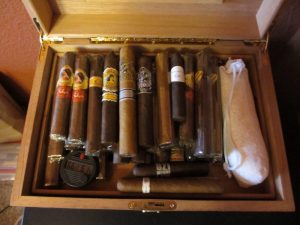
To measure the humidity and temperature in the humidor, I recommend using the HygroSet II hygrometer over the typical analog hygrometer that comes with them. These analog hygrometers are known to not be very accurate and typically are not able to be calibrated. Store the humidor in a cool location.
Advantages: Styles available, customizable, aesthetically pleasing, price (standard humidors)
Disadvantages: Limited storage capacity, price (customized and high end)
Wineador
This option consists of using a wine fridge designed for chilling wine. There are various sizes and styles of wine fridges available, but the easiest and most commonly used are ones that employ thermoelectric cooling units. These cooling units do not cause humidity fluctuations like compressor cooling units do, so it makes it work well for cigar storage. Thermoelectric cooling units are typically found in devices that have a storage capacity of 28 bottles or less. If you don’t plan to use the cooling feature, then you can use any of these devices. Units that have compressors can be used with the cooling feature, but you will need to add some additional electronics to help you prevent the humidity spikes and that information is not covered in this article.

Devices can be purchased new at various online or brick and mortar stores. What I would recommend is looking for used units locally to you on services such as Craigslist. Used units are cheaper than purchasing new. If purchasing used, you will want to determine if you want a functioning cooling feature as some units are sold used or even given away of the cooling unit does not work, so this can provide a very low cost or even a free way to acquire a unit.
Once you have a wine fridge, you will want to clean it out. Similar to the tupperdor, use distilled white vinegar to clean it out to remove any plastic smell from it. You may have to go through the cleaning process multiple times on a new one. Then you’ll want to figure out how you want to set it up for storage. You can get Spanish cedar shelves made for whatever model you’ve chosen. Companies like wineadors.com provide this service as do others. You can build shelves on your own or use the wire racks that come with the device and add cigar boxes to get some Spanish cedar into the unit. Once you’ve acquired your storage method, you will want to season it similar to the process mentioned for desktop humidors.

To maintain humidity, I would recommend using humidity beads. You will want to get the correct amount for the amount of internal space in your wine fridge. You will also want to distribute them evenly throughout the space to help keep the humidity uniform throughout. You’ll also want to be able to measure the humidity and temperature in the container and I recommend using the HygroSet II hygrometer. For a 28 bottle wine fridge, I use 1 pound of humidity beads, half at the top and half at the bottom, along with two hygrometers located in similar positions. Store the wineador in a location that works for you depending on if you are using the cooling feature or not and with the other items that have been recommended, you will have a rock solid cigar storage option.
Advantages: Storage capacity, cooling capability, price (used)
Disadvantages: Price (new), footprint
Coolerdor
This option consists of using a cooler, or “ice chest,” such as an Igloo brand cooler. There are multiple sizes available, so you can almost always find one that fits your needs. There are some models that have grooves on the inside which would allow you to install shelves or drawers similar to a wineador if you stood it on its end.

Once you have a cooler, you will want to clean it out. Similar to the tupperdor and wineador, use distilled white vinegar to clean it out to remove any plastic smell from it. You may have to go through the cleaning process multiple times on a new one. Then you’ll want to figure out how you want to set it up for storage. If the cooler has grooves in it you can get Spanish cedar shelves made for it. Companies like wineadors.com provide this service as do others. If it does not have grooves, you can use cigar boxes whole or broken down to get some Spanish cedar into the unit. Once you’ve acquired your storage method, you will want to season it similar to the process mentioned for desktop humidors.

To maintain humidity, I would recommend using humidity beads. You will want to get the correct amount for the amount of internal space in your cooler. You will also want to distribute them evenly throughout the space to help keep the humidity uniform throughout. You’ll also want to be able to measure the humidity and temperature in the container and I recommend using the HygroSet II hygrometer. Store the cooler in a cool location and with the other items that have been recommended, you will have a rock solid cigar storage option.
Advantages: Price, ease of setup, storage capacity
Disadvantages: Not aesthetically pleasing, footprint
Cabinet Humidor
This option can best be described as a desktop humidor on steroids. There are various sizes and qualities of cabinet humidors. They can be purchased as mass produced items or you can commission a cabinet builder to build one for you. There are some amazing pieces out there and some amazing builders that put together these pieces. Cabinets can be had from a few hundred dollars up to tens of thousands of dollars.

Cabinet humidors can also be had with temperature and humidity control systems in them. In regards to temperature, it can be cooling as well as heating. Most cabinet builders out there will consult with you on what you want as part of your cabinet, so you can check off pretty much anything you want from your wishlist if you’re willing to pay for it.
Once you acquire your cabinet humidor, you will want to season it. You can find more in depth info on how to do this in our article dedicated to humidor setup. To maintain humidity, you can use the built in humidification system if your cabinet came with one, but if not, use humidity beads. You will want to get the correct amount for the internal space in your cabinet. You will also want to distribute them evenly throughout the space to help keep the humidity uniform throughout.

If your cabinet has temperature and/or humidity control, it will typically have a system to measure temperature and humidity levels. I would still recommend adding some hygrometers to measure these items in other areas of the cabinet. Again, I recommend using the HygroSet II hygrometer. You will want to store the cabinet humidor in the proper location depending on if you have a temperature control system in it.



